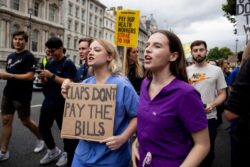Nurse voted in favour of strike action on Wednesday (Picture: Hesther Ng/SOPA Images/LightRocket via Getty Images)
Nurses across the UK voted in favour of strike action on Wednesday November 9, for the first time in the Royal College of Nursing’s 106 year history.
The union, which represents hundreds of thousands of nurses, said the strike will impact the majority of NHS employers, as workers take action against pay levels and patient safety concerns.
NHS bosses are also bracing themselves for walkouts from other health workers, including junior doctors and ambulance staff, who are also set to strike over the winter months.
But when exactly are the nurses striking and how will the strikes affect the public?
Here’s all you need to know.
When are nurses going on strike?
NHS nurses are likely to being strike action before Christmas (Picture: Getty images)
Members of The Royal College of Nursing (RCN) in England, Wales and Northern Ireland are striking today, December 15, and December 20.
It comes after negotiations between the Union and the Health Secretary earlier in the week failed to reach an agreement.
The RCN’s general secretary Pat Cullen spoke of her ‘disappointment’ at the outcome of the talks, saying: The government was true to its word – they would not talk to me about pay.
‘I needed to come out of this meeting with something serious to show nurses why they should not strike this week. Regrettably, they are not getting an extra penny.’
Why are nurses striking?
The RCN has said that in real terms, NHS nurses have suffered a real-terms pay cut of 20 per cent since 2010.
The union is campaigning for a five percent pay rise above inflation to help nurses overcome those real-terms pay cuts, support nursing staff through the cost-of-living crisis and recognise their safety critical skills.
There are also record nursing vacancies, with 25,000 nursing staff having quit in the past year.
Pat Cullen, general secretary of the RCN, said: ‘Our strike action will be as much for patients as it is for nurses – we have their support in doing this.’
However, health secretary Steve Barclay has said that he ‘deeply regrets’ that some union members have voted to strike.
Mr Barclay added that the union was ‘out of step’ with the UK’s economic situation and the RCN’s requests are not ‘reasonable or affordable’.
Which NHS trusts are taking part in strike action?
A map showing the NHS trusts that will be striking across the UK (Picture: metro.co.uk)
Strike action will take place in all NHS employers in Northern Ireland and all except one in Wales.
In England, 130 NHS employers voted in favour of strike action.
Strike action has been called off in Scotland after the government there agreed a 7.5% pay deal with Unite and Unison earlier this week.
The RCN said ‘many of the biggest hospitals’ in the country were included in the strike, adding that others narrowly missed the threshold and are therefore unable to take action.
Union members working at St Thomas’ Hospital in London, opposite the House of Commons, will strikes as well as members working at other leading hospitals in UK capitals – the Royal Infirmary of Edinburgh, University Hospital of Wales in Cardiff and Royal Victoria Hospital in Belfast.
How will the strike action affect members of the public?
Nursing strikes will affect the level of care the NHS can provide (Picture: Getty)
The nursing strikes will inevitably limit the level of care the NHS can provide.
However, ensuring that emergency services and A&E services are still running will be a priority.
Hospitals will be providing a weekend or Bank Holiday level of care.
Non-urgent operations will be postponed as well as outpatient visits and sessions of chemotherapy and kidney dialysis.
Wes Streeting, the shadow health secretary, called the planned strikes ‘unacceptable’ as they will affect patient’ care.
However, he did not criticise nurses or the union and instead blamed ministers for their lack on negotiations with the RCN.
Matthew Taylor, chief executive of the NHS Confederation, which represents most NHS organisations, said that there are plans in place to minimise the impact on patients but warned that the strikes will be ‘a challenge’ for the health service and NHS leaders.
More: Trending
He said: ‘We’re already coping with the gap that exists between the demand that is currently on the health service from the public. We’ve got to meet that demand, and we all know that we are heading into what already is a very difficult winter.
‘Then we add industrial action into that and it’s going to be an extremely difficult job.
‘The priority will be to try to minimise patient harm.’
MORE : Army on standby and Cobra summoned to deal with strikes and keeping public safe
MORE : When are the December 2022 road strikes and how will they affect Christmas travel?
MORE : Map shows which NHS hospitals will be impacted by nurse strikes
Follow Metro across our social channels, on Facebook, Twitter and Instagram
Share your views in the comments below
Nurses have voted to strike for the first time in a dispute over pay.





